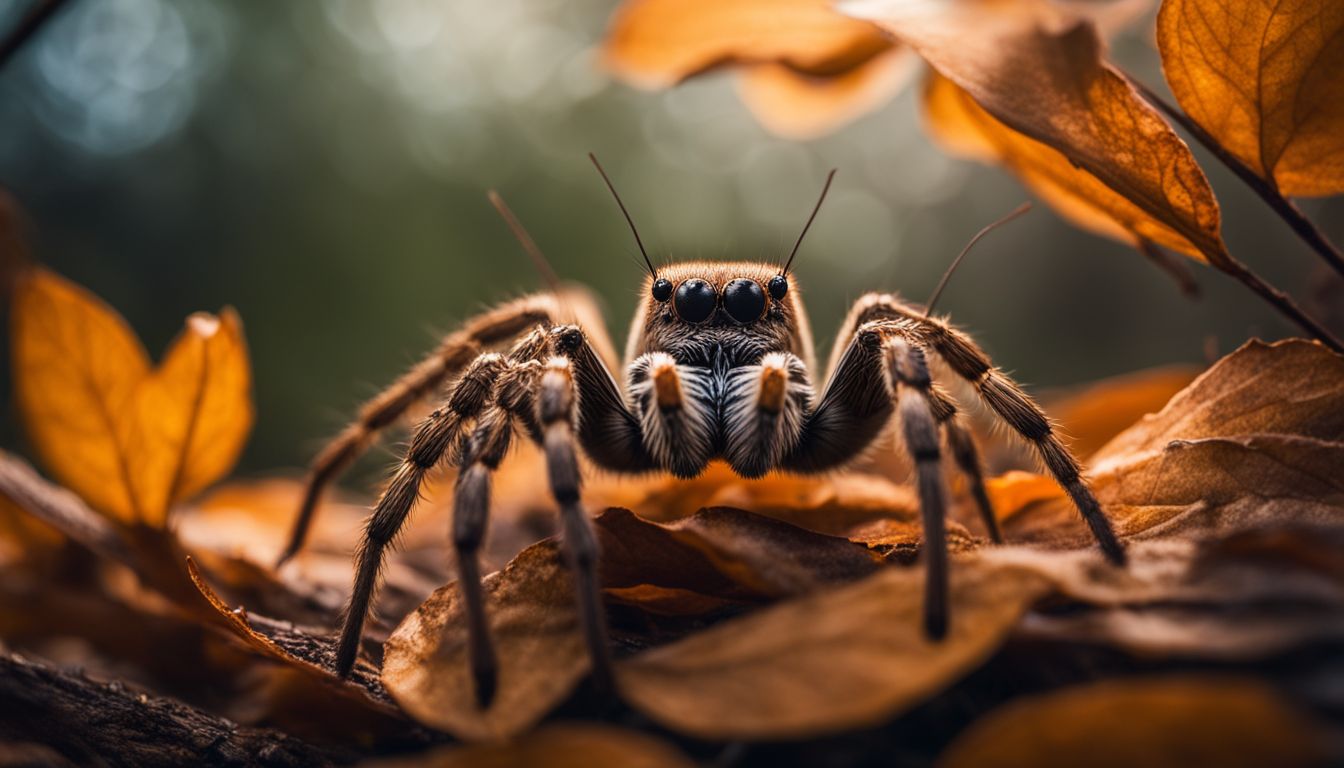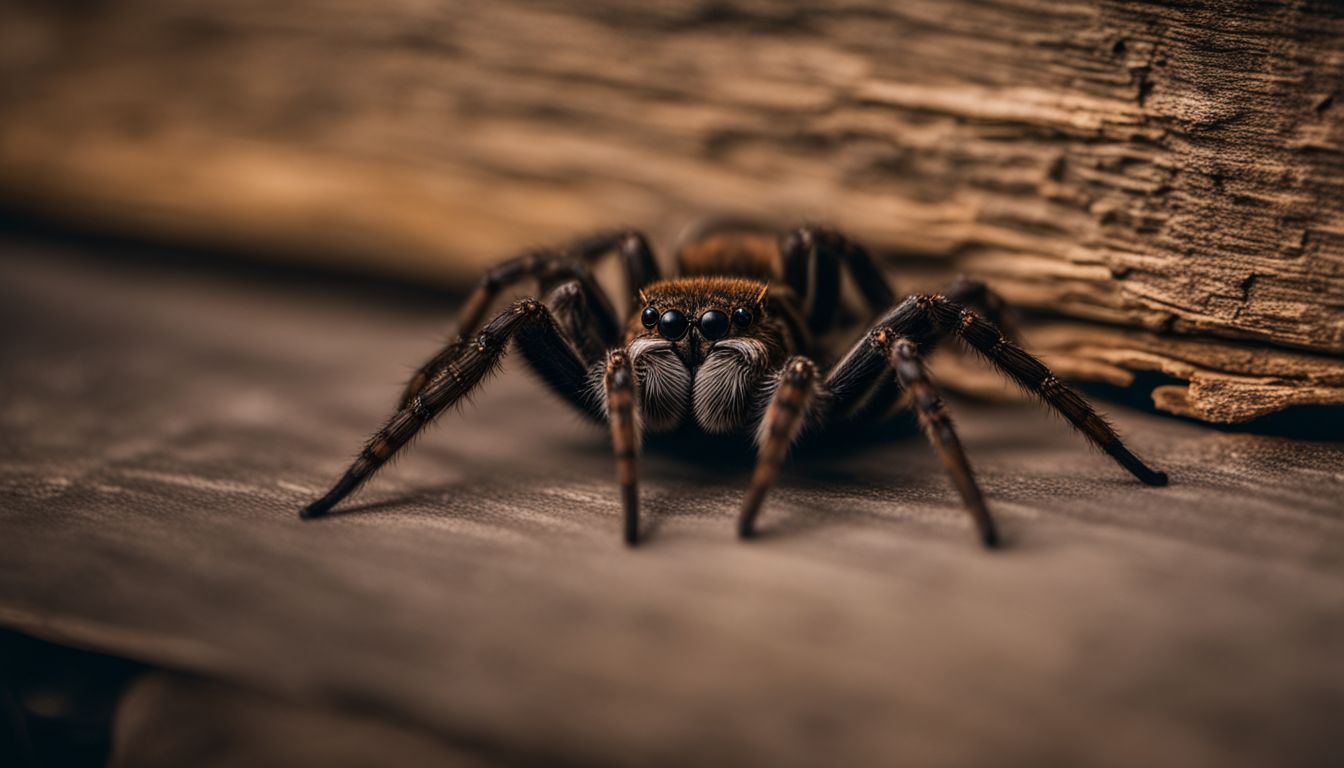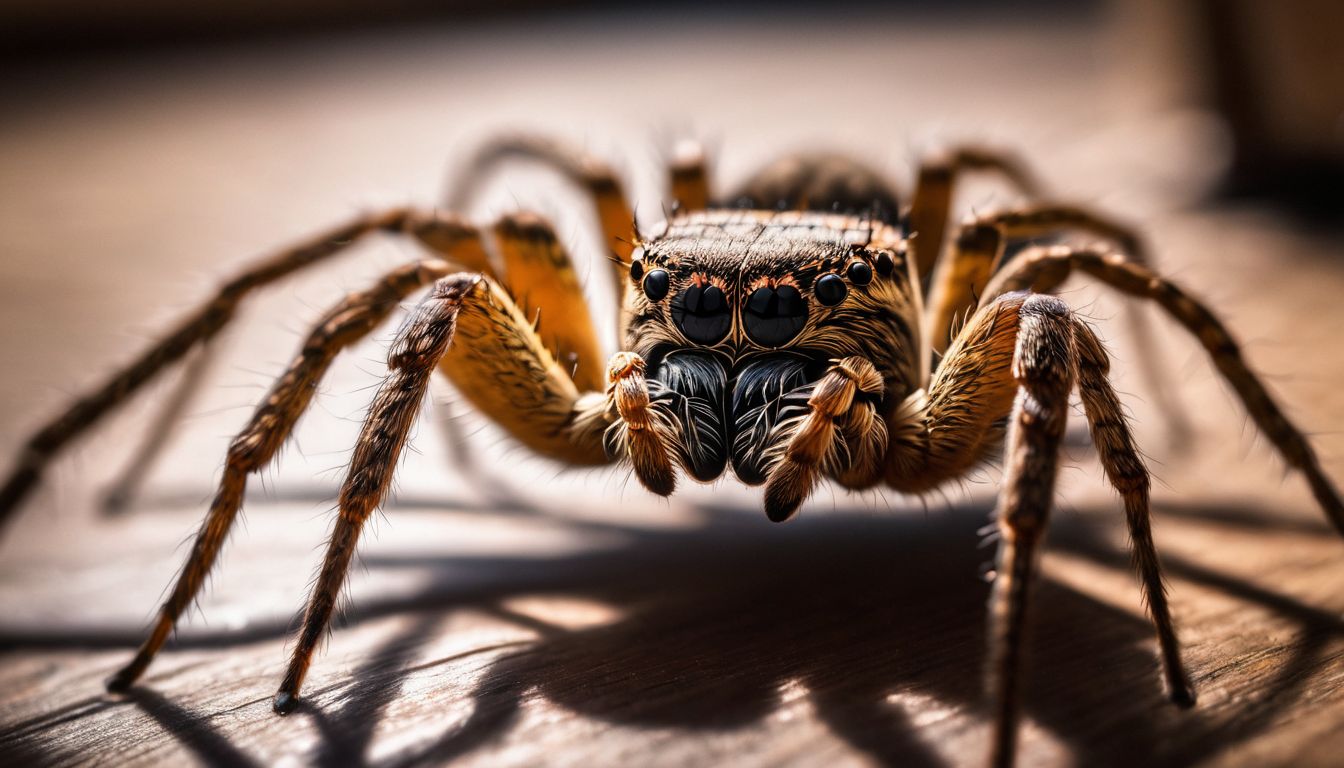Have you noticed more wolf spiders skittering around your home lately? You’re not alone – these agile hunters often slip into houses in search of food and shelter. This article will unravel the mysteries behind what draws wolf spiders into our living spaces and lay out simple strategies to keep them at bay.
Keep reading to turn the tables on these eight-legged intruders.
Key Takeaways
- Wolf spiders are attracted to houses due to the abundance of small insects like crickets and ants, which serve as their prey.
- The presence of shelter, warmth, and light sources in homes also attracts wolf spiders indoors.
- Understanding spider color preferences can help make informed decisions about the colors used inside and around homes to potentially reduce attraction for wolf spiders.
- To discourage wolf spider entry into the home, effective measures include sealing entry points, reducing outdoor lighting, and maintaining a clean and clutter-free environment.
Understanding Wolf Spiders

The wolf spider is known for its quick movement and distinct eye pattern. These spiders are typically found in natural outdoor habitats but may enter homes in search of prey or warmth.
Understanding their characteristics and behavior can help in effectively managing their presence indoors.
Identifying Characteristics
Wolf spiders stand out because they have eight eyes. Their eyes are in three rows. The bottom row has four small eyes, the middle row two very large ones, and the top row has two medium-sized eyes.
This eye pattern helps them see very well as they hunt on the ground. They do not weave webs to catch food like some other spiders.
These spiders can be brown, gray, black or tan with stripes or markings that help them blend into their environment. They are strong hunters and chase prey instead of waiting for it to come to a web.
Wolf spider bodies can grow from less than half an inch to over an inch long. When you look at them up close, you might notice hairy legs which give them a scary look for many people.
Natural Habitat and Behavior
Wolf spiders are tough, quick hunters that make their homes on the ground. They like hanging out in leaf piles or digging small holes to live in. You can find them living in many places like forests, big open fields, and even your garden! Because they don’t spin webs to catch food, these spiders spend a lot of time running around at night hunting for tasty bugs to eat.
They feel right at home under rocks, inside woodpiles or sheds, and during fall when leaves cover the ground. These hiding spots keep them safe and warm. In some parts of Australia where it’s really nice for them, you might see wolf spiders sneaking into houses looking for more bugs or a cozy corner to settle down in.
Sometimes they travel far from their outside homes because they can live just fine without making a web – this makes spotting one inside your house more likely!
Factors Attracting Wolf Spiders Indoors

Wolf spiders are attracted to homes due to the abundance of prey, shelter and warmth provided by indoor environments, as well as the presence of light sources that attract insects for them to feed on.
Understanding these factors can help in preventing wolf spider entry into your home.
Abundance of Prey
Wolf spiders love to munch on small bugs like crickets and ants. Your house might be a buffet for them if you have lots of these insects crawling around. These spiders don’t spin webs; they chase their dinner instead.
So, if your home has many earwigs, flies, or other tiny critters, wolf spiders might come in thinking it’s a good place to find food.
They are great hunters and like places where they can hunt easily. If your home is near fields or gardens with lots of insects at the ground level, you may see more wolf spiders inside.
They follow their prey which sometimes leads them right into homes by accident. If there’s enough food for them indoors, they might decide to stay.
Shelter and Warmth
The presence of shelter and warmth is a major attraction for wolf spiders when they seek out indoor spaces. As the weather cools, these spiders are drawn to human habitats in search of cozy places to stay comfortable and lay their eggs.
For wolf spiders, your home provides an ideal environment that meets their need for protection from the elements and a warm place to nestle in.
For prevention tips related to discouraging wolf spider entry into your home or space, visit the blog post’s sixth section.
Light Sources and Insect Activity
After understanding why wolf spiders seek shelter and warmth indoors, it’s vital to know that they are attracted to places with abundant insect activity. This means if your home has many insects buzzing around, it could be grounds for wolf spider attraction.
LED lights might not directly lure spiders inside, but they can make excellent hunting grounds for these opportunistic hunters. Although nearly colorblind, wolf spiders are sensitive to colors and certain light sources may affect their behavior indoors.
Furthermore, because wolf spiders primarily feed on small insects like flies and mosquitoes, the presence of these bugs in your home can attract them. So reducing the insect activity inside your house is key in deterring wolf spiders from making themselves at home.
Colour Preferences of Spiders and Its Impact on Attraction
Wolf spiders are attracted to the color green, according to a study by the University of Cincinnati. Biologists found that these spiders respond more to certain hues, with green being their favorite color.
Spiders have limited color vision and can only see green and ultraviolet light, which explains why green is so appealing to them.
The research indicates that understanding spider preferences for colors can help us make our homes less attractive to them. Using this knowledge, we can make informed decisions about the colors we use in and around our homes, potentially reducing the chances of attracting wolf spiders indoors.
Preventative Measures to Discourage Wolf Spider Entry
Sealing entry points, reducing outdoor lighting, and maintaining a clean and clutter-free environment are effective ways to keep wolf spiders out of your home. These measures can help create an inhospitable environment for these pests.
Read on to find out more about keeping your home spider-free!
Sealing Entry Points
Inspect your home for cracks, gaps, and openings in walls, doors, windows, and foundations to prevent wolf spiders from entering. Sealing entry points with caulk can help discourage wolf spider entry into the home.
- Ensure all windows have tight – fitting screens without holes.
- Use door sweeps to close the gap at the bottom of exterior doors.
- Seal any gaps or crevices around pipes, cables, and wires entering the house.
- Repair any damaged window and door frames.
- Install weather stripping around windows and doors to create a tighter seal.
- Use wire mesh to cover vents and chimney openings.
- Fill in cracks in the foundation with an appropriate sealant.
Reducing Outdoor Lighting
Reduce outdoor lighting to discourage wolf spiders from coming near your home. Bright lights at night attract insects which in turn attract wolf spiders. Here are some ways you can reduce outdoor lighting to keep wolf spiders away:
- Use motion – activated lights instead of leaving outdoor lights on all night.
- Replace white light bulbs with yellow or sodium vapor bulbs that are less attractive to insects.
- Install curtains or blinds to block indoor light from shining outside.
- Keep vegetation around your house trimmed to minimize hiding spots for both insects and wolf spiders.
- Consider using bug zappers away from the house to draw insects away from your living space.
Maintaining a Clean and Clutter-Free Environment
Reducing outdoor lighting is one step to deter wolf spiders from entering your home. Keeping a clean and clutter-free environment is essential to discourage these spiders. Here’s how you can maintain a clean and clutter-free environment to prevent wolf spiders from taking up residence:
- Regularly sweep and vacuum your home, especially in corners and behind furniture where spiderlings often hide.
- Keep storage areas tidy by organizing items in sealed containers to prevent spiders from nesting.
- Dispose of any unnecessary clutter, such as old boxes, clothes, or newspapers that can create hiding spots for spiders.
- Clean up debris in your yard and keep the grass trimmed to reduce potential hiding places for wolf spiders.
- Seal cracks and gaps in walls, floors, and windows to prevent spider entry points into your home.
Conclusion
In conclusion, wolf spiders are attracted to houses due to the abundance of insects drawn to outdoor lights. These spiders hunt their prey instead of weaving webs, making them more likely to enter homes in search of food.
To deter them, minimizing outdoor lighting and keeping shades drawn can help reduce insect activity and prevent the attraction of wolf spiders indoors. Therefore, being mindful of outdoor lighting and taking measures to minimize it can effectively discourage wolf spiders from entering the house.
Discover how the colors of your home can impact spider behavior by exploring our informative guide on what colors spiders hate.
FAQs
1. What makes wolf spiders come into my house?
Wolf spiders enter homes looking for food and shelter. They like quiet, less disturbed places like cellars.
2. How can I tell if a spider in my house is a wolf spider?
To identify a wolf spider, look for a big, hairy spider that doesn’t make webs but hunts on the ground.
3. Are wolf spiders the same as brown recluses or black widows?
No, wolf spiders are different from brown recluses and black widows because they hunt differently and don’t have the same dangerous bite.
4. What should I do if there’s a spider infestation in my home?
For any spider problem including an infestation of egg sacs or bed bugs call pest control experts who use integrated pest management to keep your home safe.
5. Can cleaning help prevent wolf spiders from coming inside?
Yes, regular cleaning reduces the chances of getting all kinds of pests like tarantulas and wolves by keeping away their food sources and hiding spots.




